
Sometimes your body whispers before it starts shouting. Small signs that seem harmless might actually be your body’s way of saying, “Hey, I need a little help here!” Catching those early clues can really make a big difference in staying healthy.
CONTENT IS PROVIDED FOR INFORMATIONAL PURPOSES ONLY AND IS NOT INTENDED AS A SUBSTITUTE OF MEDICAL ADVICE.
SEEK GUIDANCE OF YOUR DOCTOR REGARDING YOUR HEALTH AND MEDICAL CONDITIONS.
1. Pale lips

Pale or white lips can be a sign that something is wrong with your health — like a lack of blood or oxygen. The most common causes of pale lips are:
- Anemia — when your body doesn’t have enough red blood cells, your lips can look pale. This is often accompanied by fatigue, dizziness, and feeling cold.
- Dehydration — not drinking enough water can lead to dry and pale lips. You may also notice dry mouth and dark urine.
- Low blood sugar — if your blood sugar levels suddenly drop, your lips may turn pale. Other signs are shivering, sweating and confusion.
- Poor circulation — heart problems or low blood pressure can reduce blood flow, making the lips look pale. It’s not a bad idea to get checked out by a doctor.
- Mouth thrush — this infection in the mouth can cause white plaque, including on the lips. It is often associated with a weak immune system or taking antibiotics for a long time.
- Cold weather — cold air can constrict blood vessels and make lips pale. Moisturizing your lips helps protect them in cold temperatures.
2. Neck lines

After menopause, women’s estrogen levels drop, which can affect bone health over time. A lesser-known sign that your bones might be getting weaker is the development of noticeable wrinkles on your neck.
These lines could mean your bones are losing density, putting you at greater risk for fractures. To support bone strength, adding calcium and vitamin D to your routine might be a smart move. It’s also helpful to check in with a doctor about bone screenings and nutrition.
3. Red bumps

Skin bumps can pop up for all sorts of reasons—anything from acne and allergic reactions to conditions like keloids or shingles. Sometimes they’re linked to more serious health concerns.
In most cases, these bumps aren’t harmful and don’t need medical treatment. But if they start bothering you or feel uncomfortable, it’s always a good idea to check in with your doctor. It’s better to be safe and get peace of mind.
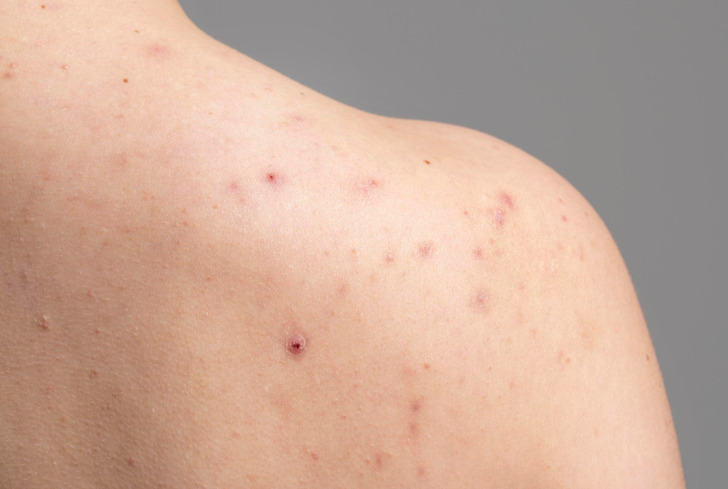
Keratosis pilaris, sometimes nicknamed “chicken skin,” shows up as small, rough bumps on areas like your cheeks, upper arms, or thighs. It happens when keratin, a protein in your skin, clogs hair follicles, leading to those red or white bumps.
Experts still don’t know exactly why it happens, but it often runs in families. There’s also a chance that not getting enough vitamins A and C in your diet might play a role. While it’s harmless, it can be frustrating to deal with.
4. Muscle cramps

If you’re dealing with things like sudden muscle cramps, your body might be running low on calcium. This isn’t something to brush off—without enough calcium, your nerves, muscles, and even your heart can struggle to work properly. Calcium keeps everything from your heartbeat to your blood clotting on track, so staying on top of it matters.
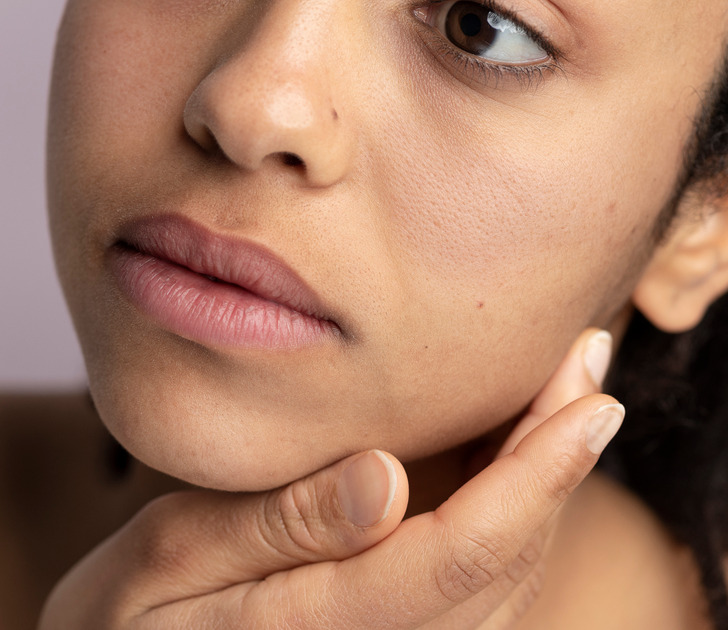
Dry skin and easily breaking nails can be more than just cosmetic issues—they also might be your body’s way of flagging low calcium levels. When calcium drops too low, it can lead to hypocalcemia, a condition often linked to low vitamin D or problems with parathyroid hormone. It’s worth checking with a doctor if you notice these changes. Addressing it early can help prevent more serious complications.
5. Hair loss

Noticing more hair in your brush than usual? Hair loss can sometimes point to a lack of certain nutrients in your diet. Key players like iron, biotin (B7), niacin (B3), and essential fatty acids like ALA and LA help support healthy hair growth and prevent thinning.
When these nutrients are missing, your body might struggle to maintain strong, full hair. If you’re dealing with hair loss, it might be worth reviewing your nutrition and considering a check-in with a healthcare provider.
8 Must-Try Manicure Trends Dominating Salons This Summer 2025
6. Changes in the appearance of the nails
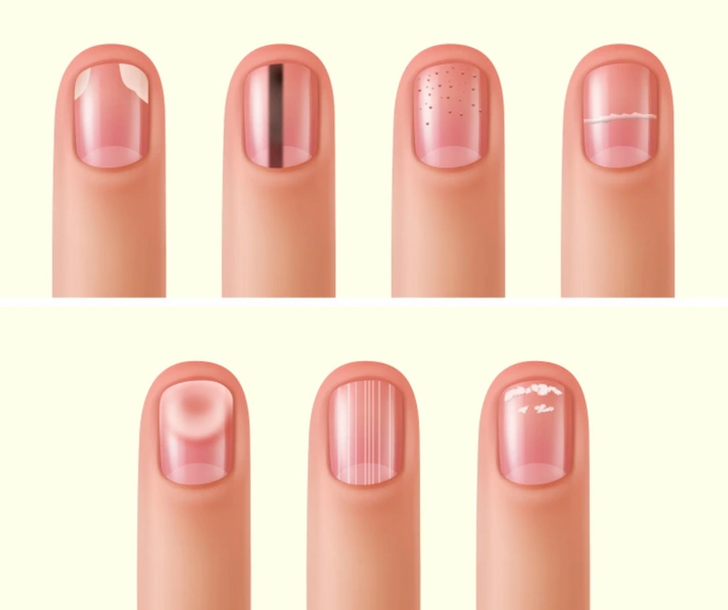
Dotted depressions on the nails can be a sign of diseases such as psoriasis, atopic dermatitis, alopecia areata.
If the edges of your nail plates have begun to curve upwards, making your nails resemble a spoon, your body may be deficient in iron. Often, the deficiency of this trace element develops with poor diet, stomach, and intestinal problems. Also, spoon-shaped nails can appear in heart and thyroid diseases.
Vertical, slightly convex lines are usually a sign of natural aging or injury to the nail. As people age, they often notice an increase in the number of these stripes on their nails. White spots on the nails can appear as a reaction to trauma, an allergic reaction, or a deficiency of zinc, calcium, or protein in the body. In some cases, they can also indicate liver or kidney problems.
And here we talked about 8 imperceptible changes in your body that could be a warning sign of health problems.
6 Natural Ways to Get Rid of Pimples and Make Your Skin Happy / Bright Side
Eat Your Way to Glowing Skin: Top 10 Collagen-Supporting Foods
Content is provided for informational purposes only and is not intended as a substitute for medical advice. Seek guidance from your doctor regarding your health and medical conditions.
Maintaining firm, youthful skin isn’t just about what you put on your body — it’s also about what you put in it. Collagen, the most abundant protein in the human body, plays a key role in skin elasticity, hydration, and overall appearance. As we age, our natural collagen production slows down, making it essential to support it through our diet. Luckily, many foods can help stimulate collagen synthesis and protect existing collagen in the body.
How does collagen work?
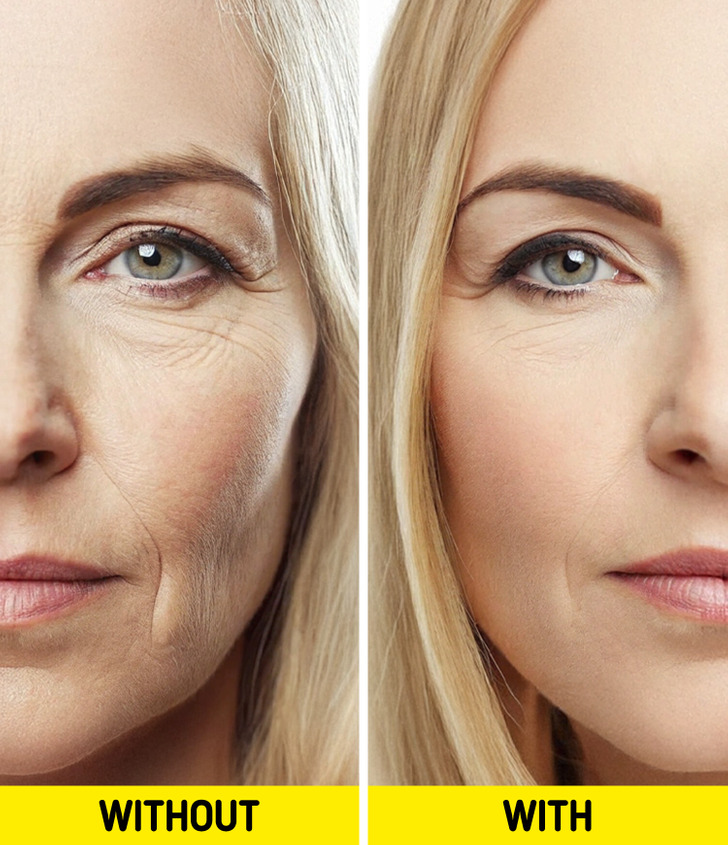
Collagen acts as a support structure in the skin, providing firmness, elasticity, and strength. This protein forms a network of fibers that keeps the skin smooth and supple, helping it recover from stretching and injury. As we age, natural collagen production decreases, leading to a loss of volume and elasticity, giving way to wrinkles, fine lines, and sagging. Therefore, maintaining adequate collagen levels is key to maintaining a youthful appearance and healthy skin.
Collagen = A more hydrated skin
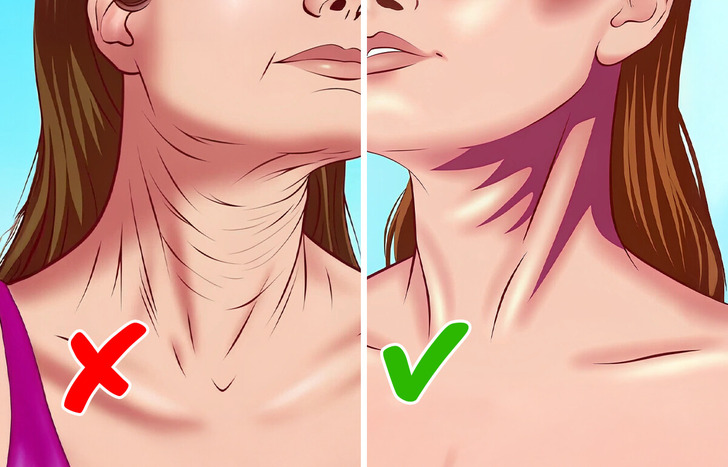
Collagen plays a crucial role in skin hydration by strengthening the skin’s structure and improving its ability to retain moisture. A randomized, placebo-controlled clinical study showed that daily supplementation of collagen, along with acerola extract, vitamin C, zinc, biotin, and vitamin E, for 12 weeks resulted in significant improvements in skin hydration, elasticity, roughness, and density. These improvements were maintained even four weeks after discontinuation of supplementation, indicating sustained effects on skin health.
At what age should you start a collagen-boosting routine?
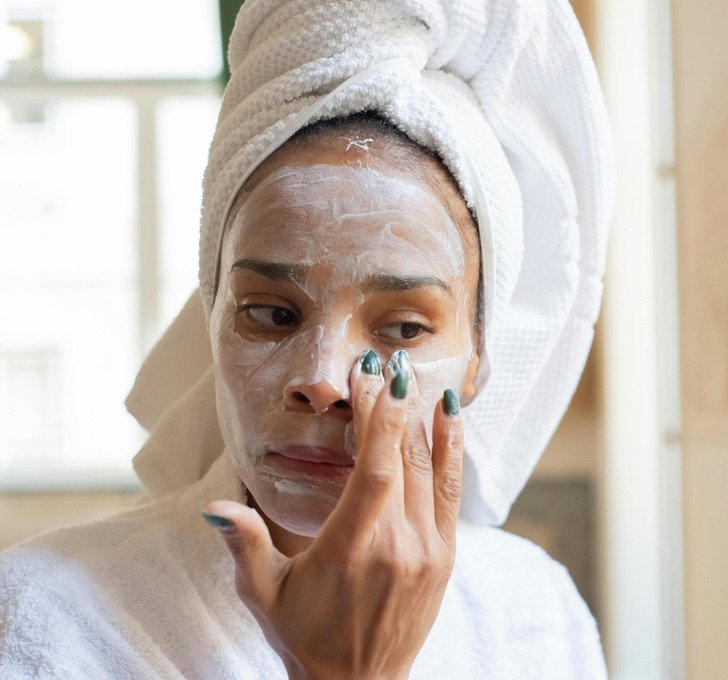
The body’s natural collagen production begins to decline after the age of 25, which can lead to a loss of firmness, elasticity, and radiance in the skin. It is therefore recommended to incorporate a routine where collagen is present. By doing so, you can prevent the appearance of wrinkles and other visible signs of aging, keeping your skin firmer and healthier over time. If you are older, it also works to improve the quality of your skin.
Similarly, using sunscreen can help prevent collagen loss, as sun exposure is very damaging to the skin.
Foods that support collagen production.

Gelatin is an excellent source of collagen. Both collagen and gelatin share important benefits, as gelatin is derived from cooked collagen. Consuming gelatin can support the body’s natural collagen production, helping to maintain skin elasticity and reducing joint wear and tear over time. It is also versatile and easy to incorporate into your daily diet.
Bone broth.

Bone broth is one of the most potent natural sources of collagen. Made by simmering animal bones and connective tissue over a long period, it releases collagen, gelatin, and essential amino acids like glycine and proline into the broth. These nutrients directly support skin elasticity, hydration, and repair. Regularly consuming bone broth can help restore youthful skin and reduce signs of aging.
Avocados.
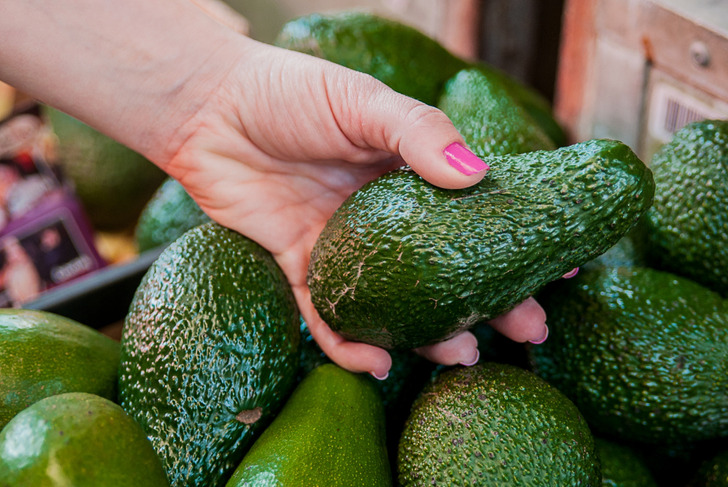
Avocados are rich in healthy fats and vitamin E, a powerful antioxidant that helps protect collagen fibers from damage. They also contain compounds that may help boost the skin’s natural barrier and moisture levels. Including avocados in salads, spreads, or smoothies can support skin hydration, elasticity, and collagen maintenance.
Octopus.

Octopus, as well as being a rich source of protein and essential minerals, contains collagen in its skin and muscles, making it a beneficial food for skin health. Recent studies have identified compounds in octopus skin that possess antioxidant properties and can stimulate collagen production in the skin, keeping it hydrated.
Spinach.
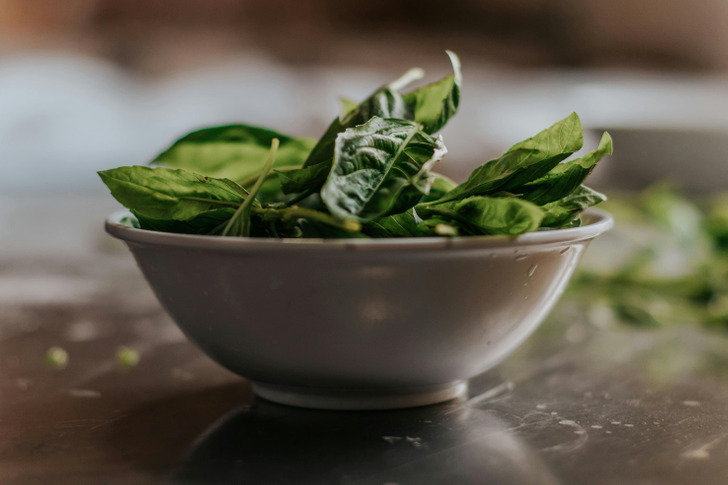
Spinach is a vegetable that can contribute significantly to collagen production in the body. This is due to its high content of chlorophyll, the pigment responsible for its deep green color, which has been shown to promote the formation of collagen precursors, known as procollagen, essential for maintaining skin elasticity and firmness.
In addition, spinach is rich in vitamin C, a key nutrient that stimulates collagen synthesis and protects skin cells against oxidative damage. Incorporating spinach into your daily diet, whether in salads, smoothies, or cooked dishes, is a simple and delicious way to care for your skin.
Tripe.
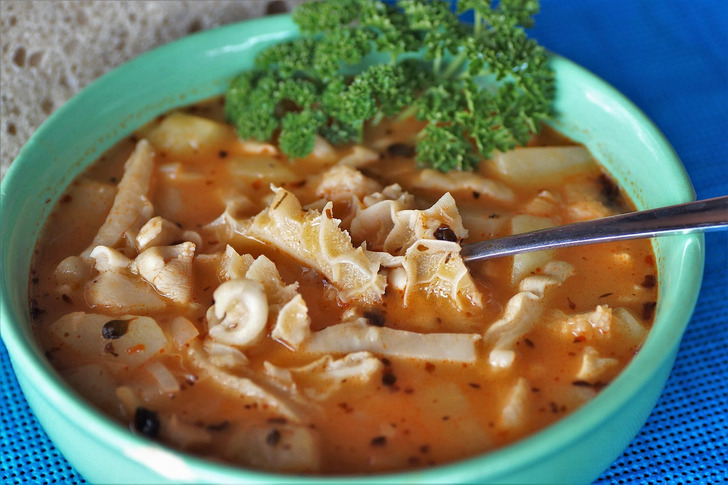
Tripe is a part of the stomach of ruminant animals, such as cows, and is noted for its high collagen content. Consuming tripe can be an excellent way to support collagen production, contributing to healthier skin and stronger joints. You can add this food to your diet through stews or soups.
Berries (especially strawberries, blueberries, and raspberries).
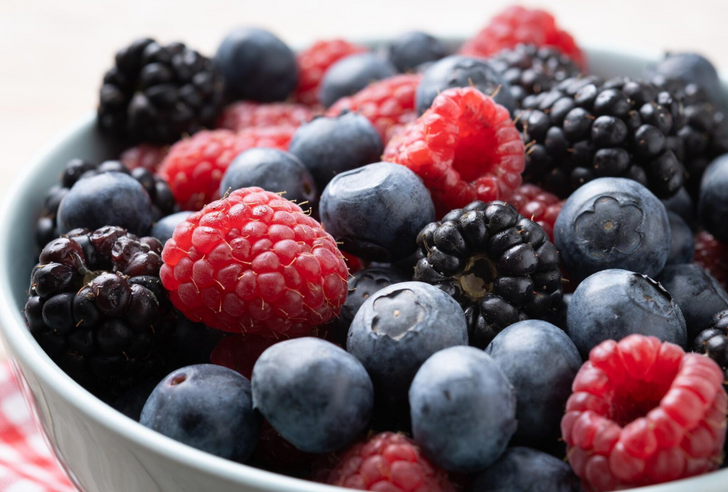
Berries are loaded with antioxidants and vitamin C, both of which are crucial for collagen production and protection. These fruits help fight free radicals that degrade collagen and promote new collagen formation. Including a variety of berries in your diet can not only improve skin appearance but also enhance its resilience over time.
Squid.

Squid is an outstanding source of collagen. If you want to maintain skin elasticity and firmness, as well as joint health, it is best to implement this food into your diet. Studies have shown that collagen extracted from squid skin contains a high percentage of collagen, with a low fat content and a high proportion of moisture, which facilitates its absorption into the body.
In addition, this collagen is rich in amino acids such as glycine and proline, which are essential for collagen synthesis in the body.
Citrus Fruits (like oranges, lemons, and grapefruits).
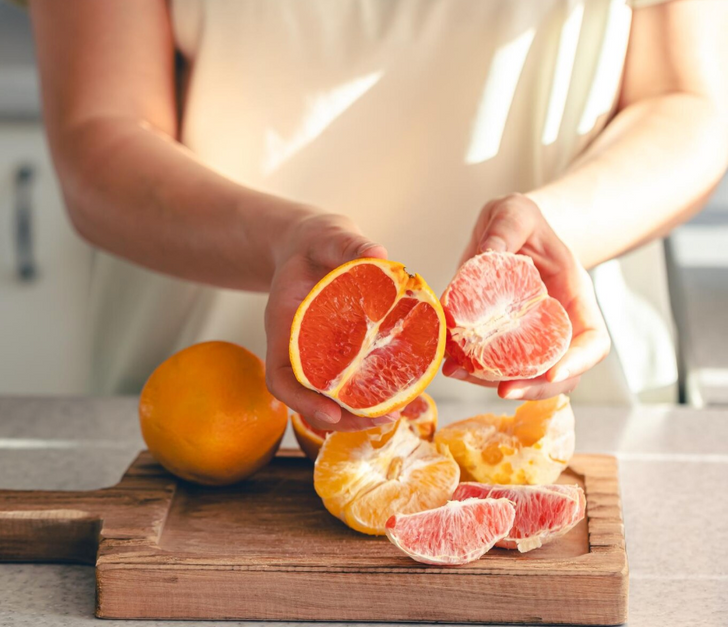
Citrus fruits are exceptionally rich in vitamin C, a key player in the collagen synthesis process. Vitamin C not only boosts the production of collagen but also protects existing collagen from oxidative damage. Adding citrus fruits to your daily diet—whether through fresh juices, fruit salads, or as a zesty addition to meals—can help maintain firm, glowing skin.
Kiwi.
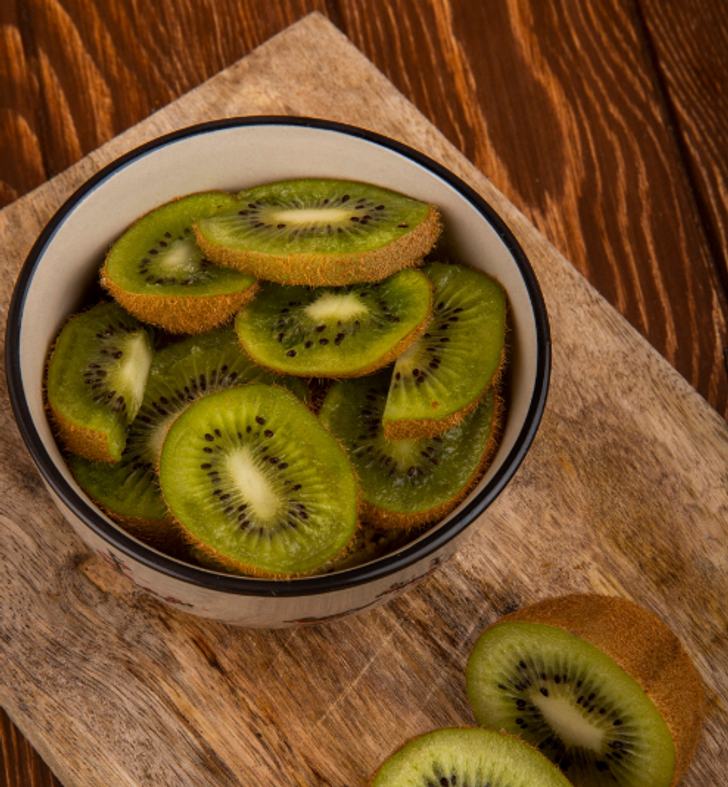
Kiwi is a fruit rich in vitamin C, an essential nutrient for collagen synthesis. Consuming kiwifruit regularly can stimulate the body’s natural collagen production, helping to maintain firm, healthy skin. In addition, kiwifruit contains antioxidants that protect skin cells against oxidative damage, contributing to a more youthful appearance. It can be eaten in salads, smoothies, or as a healthy snack.
Garlic.
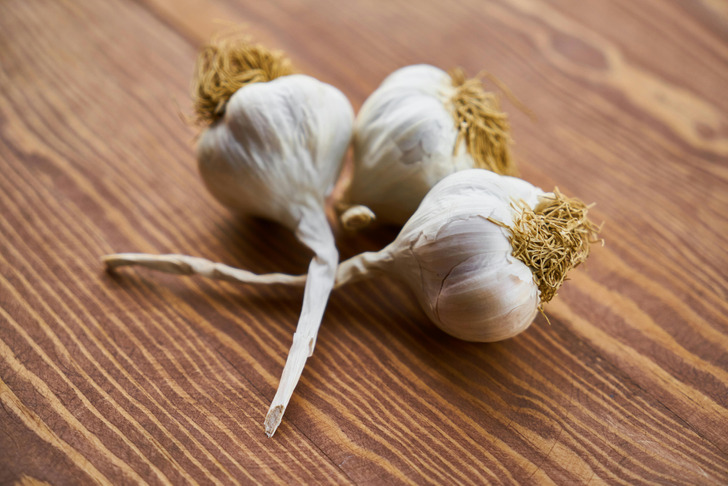
Garlic not only adds flavor to our meals, but it can also be beneficial for the body’s production of collagen. Garlic is rich in sulfur, a trace mineral that helps synthesize and prevent the breakdown of collagen. Making a stew, sauce, or dressing with garlic can help maintain firm, healthy skin.
Whether it’s through protein-rich seafood, vitamin-packed fruits, or nourishing broths, these foods can make a noticeable difference over time. You may also want to know about some red flags your body raises when you might be low in iron, and unexpected body changes during menopause — both packed with insights to help you stay in tune with your body and feel your best.











:max_bytes(150000):strip_icc():focal(749x0:751x2):format(webp)/firefighters-recue-dog-that-fell-in-icy-pond-1-010226-2239db48a5894b2ca6ea50c805da048f.jpg?w=1200&resize=1200,0&ssl=1)





















:max_bytes(150000):strip_icc():focal(999x0:1001x2)/catherine-ohara-013026-7-4b5b413a646d4f15a1fd15ac8b933811.jpg?w=1200&resize=1200,0&ssl=1)








